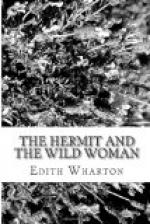The picture produced a different and less flattering effect on the critics. They gave it, indeed, more space than they had ever before accorded to the artist’s efforts, but their estimate seemed to confirm Caspar Arran’s forebodings, and Stanwell had perhaps never despised them so little as when he read their comments on his work. On the whole, however, neither praise nor blame disquieted him greatly. He was engrossed in the contemplation of Kate Arran’s happiness, and basking in the refracted warmth it shed about her. The doctor’s prognostications had come true. Caspar was putting on a pound a week, and had plunged into a fresh “creation” more symbolic and encumbering than the monument of which he had been so opportunely relieved. If there was any cloud on Stanwell’s enjoyment of life, it was caused by the discovery that success had quadrupled Caspar’s artistic energies. Meanwhile it was delightful to see Kate’s joy in her brother’s recovered capacity for work, and to listen to the axioms which, for Stanwell’s guidance, she deduced from the example of Caspar’s heroic pursuit of the ideal. There was nothing repellent in Kate’s borrowed didacticism, and if it sometimes bored Stanwell to hear her quote her brother, he was sure it would never bore him to be quoted by her himself; and there were moments when he felt he had nearly achieved that distinction.
Caspar was not addicted to the visiting of art exhibitions. He took little interest in any productions save his own, and was moreover disposed to believe that good pictures, like clever criminals, are apt to go unhung. Stanwell therefore thought it unlikely that his portrait of Mrs. Millington would be seen by Kate, who was not given to independent explorations in the field of art; but one day, on entering the exhibition—which he had hitherto rather nervously shunned—he saw the Arrans at the end of the gallery in which the portrait hung. They were not looking at it, they were moving away from it, and to Stanwell’s quickened perceptions their attitude seemed almost that of flight. For a moment he thought of flying too; then a desperate resolve nerved him to meet them, and stemming the crowd, he made a circuit which brought him face to face with their retreat.
The room in which they met was momentarily empty, and there was nothing to intervene between the shock of their inter-changed glances. Caspar was flushed and bristling: his little body quivered like a machine from which the steam has just been turned off. Kate lifted a stricken glance. Stanwell read in it the reflexion of her brother’s tirade, but she held out her hand in silence.
For a moment Caspar was silent too; then, with a terrible smile: “My dear fellow, I congratulate you; Mungold will have to look to his laurels,” he said.
The shot delivered, he stalked away with his seven-league stride, and Kate moved tragically through the room in his wake.




